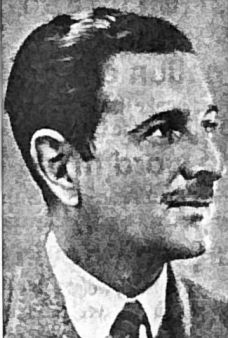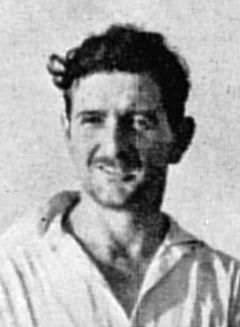View entry
Name: HENNINGS, Richard Owen CMG


Birth Date: 8.9.1911 Epsom, Surrey
Death Date: 22.11.1993 Chesterford, Saffron Walden
First Date: 1935
Profession: Appointed DO 1935. At Fort Hall in 1939. Sec. for Agriculture in 1953.
Area: Fort Hall, Nairobi, Eldoret
Married: In Durban 1939 Constance Juliet Patricia Milton-Sexton b. 24.1.1927 Nairobi, d. 1995 Hackney (dau of William Milton Sexton)
Children: Felicity Ann (Binns) (1945)
Author: 'African Morning'
Book Reference: Staff 39, Staff 53, Carson, Cass, Colonial, EA & Rhodesia, O&C, The Times, Foster
School: Cheltenham and New College Oxford 1930-33 and 1934-35; BA (Oxon)
General Information:
East Africa & Rhodesia - 20/6/57 - CMG The Times - Obit. 22-12-1993 - Richard Hennings served with distinction in the Kenya administration from 1935 to 1962. He played a major role with Sir Evelyn Baring and Roger Swynnerton in the African agricultural revolution during his 12 years as Secretary to the Minister of Agriculture, 1947 to 1959. The last 8 years of this long continuity of policy were the most fruitful in the history of Kenya when Hennings was, first, executive officer to the African Land Development Board (ALDEV), for one year 1951-52, and then chairman of that board for the next 7 years. He was thus directly responsible for shaping and executing the imaginative policy of Sir Evelyn Baring, embodied in the Swynnerton plan for the Intensification of African Agriculture.
In the aftermath of Mau Mau, the consequence was not only the absorption of the bitterness and the pent-up energies of both sides but, more importantly, the elevation of farming from a banausic trade, "women's work" to a Primacy in the professions, the climax of ambitions.
Richard Owen Hennings was born in Surrey and shortly after his birth moved to Singapore where his father was in shipping. In August 1914, he returned with his mother and sister to spend the First World War in Sutton, Surrey. Both his mother and sister rejoined his father in Singapore in 1918, but - in the best "sons of the Empire" tradition - Richard was left with a maiden aunt in Wrexham. He went to Pinewood Preparatory School, Farnborough, where he took ther leading part in Shakespeare plays as he was the only boy who could remember the lines. Hennings was then sent to Cheltenham College and in 1930 went up to New College, Oxford where he read Greats, winning the Newdigate Poetry Prize.
A man of many parts, his first choice on leaving Oxford was to become a writer but his father persuaded him to take up something more "solid". He went to Zurich University for French and German and then took the Colonial Services course. He joined the Kenya Administrative Service in 1935 as a cadet, and was posted to Kabarnet under Blackwood Murphy and then to Tambach under Carver, both good district commissioners. These districts and their people, from whom came the formidable Olympic athletes of later years, remained his first love and provided the inspiration for his book 'African Morning' (1951), describing the life of a district officer. (It has deservedly, become required reading for those taking African studies as their university course)
He was also posted to Kakamega and Fort Hall under Jack Clive ("the best") and Narok under Bill Perreau. In 1939 he went on leave intending to go round the world, having saved £100 towards the ticket. He reached Manila when war broke out, so he returned to Kenya via South Africa, marrying his fiancée from Kenya in Durban. On his second tour, 1939-46 Hennings had 11 postings plus two short spells on relief. Though these many moves may have been tiresome at the time, his experience in all but the Coast Province was valuable for his crowning work. The Northern Frontier District and Southern Ethiopia gave him first-hand information for his book on that troubled border, a work which is, sadly, as yet unpublished.
In 1945-46 he was promoted to District Commissioner, Rumuruti, which included the Samburu people, the close kinsfolk of the Masai. That was the culmination of his service in the provincial administration. For the rest of his career he was in the Secretariat, ending as Deputy Chief Secretary in 1962, a nominated member of Legislative Council, and also of the Legislative Assembly of East Africa. He was appointed CMG in 1957.
Hennings had many interests. At Zurich, he played ice hockey for the university. He did a walking tour in the Black Forest and crossed the United States by car. He was a good tennis player, guitarist, mountaineer, gardener, and specialist in the succulents of the African dry country and cowries of the coast. But his favourite hobby was ski touring and, for several years after retirement, he was secretary of the Alpine Ski Club and edited the Ski Club magazxine. He formed, and for 12 years chaired the Great Chesterford Archaeological Society, and personally discovered the Romano-Celtic silver mask in the Cambridge Museum. ………… In 1941 he published his first novel, 'Arnold in Africa', a light-hearted look at Kenyan society in the manner of Evelyn Waugh. Ten years later his second novel, 'African Morning' followed.
Colonial - Political Officer Ethiopia 1941; Permanent Sec. Kenya 1956; Dep. Chief Sec. 1960
Gazette 6 Dec 1938 Uasin Gishu Voters Roll expunged
